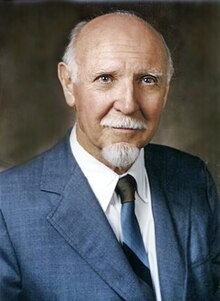Raymond Cattell

Raymond Bernard Cattell, PhD, DSc (20 March 1905 – 2 February 1998) was a British-American psychologist, known for his psychometric research into intrapersonal psychological structure. His work also explored the basic dimensions of personality and temperament, the range of cognitive abilities, the dynamic dimensions of motivation and emotion, the clinical dimensions of abnormal personality, patterns of group syntality and social behavior, applications of personality research to psychotherapy and learning theory, predictors of creativity and achievement, and many multivariate research methods including the refinement of factor analytic methods for exploring and measuring these domains.
| This article about a psychologist is a stub. You can help out with Wikiquote by expanding it! |
Quotes
[edit]- The danger is not only that politicians and private institutions with axes to grind will find tame or corruptible social scientists to support their positions. The greater danger which recent experiences both here and abroad, e.g., Lysenkoism in Russia, have revealed is that partisans primarily political in interest and intention either accidentally or deliberately infiltrate the ranks of science. In the case of the Lysenko episode, and comparable events in Nazi Germany, the disturbing realization to scientists was that the exile or death of those ejected from their academic positions followed what seemed initially to be severe technical criticism by fellow scientists, but was actually politically staged.
- Cattell (1972). A New Morality from Science: Beyondism, p. 38.
- A taxonomy of abilities, like a taxonomy anywhere else in science, is apt to strike a certain type of impatient student as a gratuitous orgy of pedantry. Doubtless, compulsions to intellectual tidiness express themselves prematurely at times, and excessively at others, but a good descriptive taxonomy, as Darwin found in developing his theory, and as Newton found in the work of Kepler, is the mother of laws and theories.
- Raymond Cattell (1987), Intelligence: Its Structure, Growth and Action. p. 61
The Scientific Analysis of Personality, 1965
[edit]Raymond Cattell (1965). The Scientific Analysis of Personality, Baltimore, MD: Penguin.
- Psychology appeared to be a jungle of confusing, conflicting, and arbitrary concepts. These pre-scientific theories doubtless contained insights which still surpass in refinement those depended upon by psychiatrists or psychologists today. But who knows, among the many brilliant ideas offered, which are the true ones? Some will claim that the statements of one theorist are correct, but others will favour the views of another. Then there is no objective way of sorting out the truth except through scientific research.
- p. 14 (quote doesn't seem to be present in 1966 edition)
- Of course, science lives by confusing theories, but what were accepted as 'theories' even by the many professional psychologists and psychiatrists were very poor limitations of what physical scientists call a theory.
- p. 16 (1966 edition)
- Psychology is a more tricky field, in which even outstanding authorities have been known to run in circles, 'describing things which everyone knows in language which no one understands'.
- p. 18
- (Personality is)... that which tells what a man will do when placed in a given situation.
- p. 25
- Subjectively the possession of a role factor is felt as a 'mental set' which modifies all ordinary responses. The very same stimulus is perceived in a different way when one is in the role and when one is out of it... Technically, we handle this change of perception the same way in a role as in a mood—both of which can intrude on the ordinary personality — by this special factor, L, which can be called a modulator factor. A modulator factor comes into action only when the usual ordinary 'focal stimulus' comes into the orbit of a set of role cues which we may call the 'ambient' or surrounding stimulus.
- p. 160
- The first way in which one notices that a sentiment structure is different from an erg is that the emotional (ergic goal) qualities which enter it are very diverse, whereas in an erg they are all of one quality, e. g., gregariousness, sex... The sentiment brings together attitudes, in fact, with several different ergic roots, but only one source of learning.
- p. 192
- Overt anxiety... that part of anxiety of which the individual is aware and ready to speak.
- p. 372
- Dominance... is shown in assertive, independent, confident and stubborn behaviour.
- p. 369

